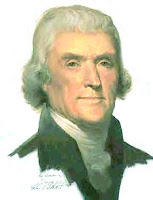As most of you know already, John Locke stands as something like John the Baptist to the political geniuses of the American founding, a prophet of the coming of a never-before-seen constitutional republic. His political teaching became the summary statement of early modern liberalism, in much the same way as Francis Bacon’s earlier teaching on the scientific method helped form the base from which modern science and technology was launched. But though both Locke’s and Bacon’s positions have been controverted in the last four hundred years, Locke found his nemesis in the very next generation in David Hume, a near contemporary of the American founding, who was particularly exercised to see to it that the “Whiggishness” Locke spoke for did not become entrenched in the mind of the British public.
My intention here is not to exclude the consent of the people from being one just foundation of government where it has place. It is surely the best and most sacred of any. I only pretend, that it has very seldom had place in any degree, and never almost to its full extent.
Hume died in 1776, just as things were getting interesting on this side of the Atlantic, and so did not witness the birth of a nation making explicit its embrace of Lockean consent as the center piece of legitimate government. And yet, contra Jefferson, Hume wrote that he considered himself “American in my principles”, while being skeptical of abstract thought, especially political, ideological abstractions. Looking to history for guidance, which is what any self respecting empiricist historian would do, Hume saw no evidence that any group of people had ever gathered, recognized their meager and dangerous prospects as individuals, and consented to cede their individual prerogative to take matters into their own hands and to place their trust in a government to protect their rights. And yet this is almost precisely what the American colonies did vis-à-vis the overbearing George III and Parliament. Declaring that the King was menacing their rights instead of protecting them, they sought to form a government that would protect their rights and be responsive to the principle of consent.
Hamilton, a noted fan of Hume (and like Hume Jefferson’s enemy), counted consent the “pure original fountain of legitimate authority” (Federalist 22), channeling the spirit of Locke as accurately as Jefferson ever did. And though the Wilsonian Progressives and their ideological descendants are wont to claim Hamilton’s patrimony of large ideas for energetic government, and a large scope for it too; they yet have little use for the consent of the governed, preferring the rule of experts to guide the hapless and sadly incapable mass of the people who need to be “nudged”, in Cass Sunstein’s phrase, in order to get to the right conclusions. None of these philosophers and statesmen—Locke, Hume, Madison, Hamilton, Jefferson—though distrustful of human frailty and moral shortcomings, were so literally dismissive of the consent of the governed as our present day elites. That the elites of our time, both inside and outside the government of our constitutional republic, eschew the role of the public in the res publica, “the affair of the people” as the ancient Latin has it, is both dangerous and remarkable. This mindset undermines not only the constitution, but the thinking that underpins it; and thus the Lockean natural rights /state of nature /social contract understanding that suffused the thinking of the Founders and yielded the unambiguously best constitution in history, gives way to a Humean theoretical skepticism regarding our own actual beginnings—a most unhistorical and un-empirical view.
But what is that to the dilettantes running the joint, immersed in rationalist abstractions like “History” and utterly oblivious and dismissive of Nature, and Nature’s God?










